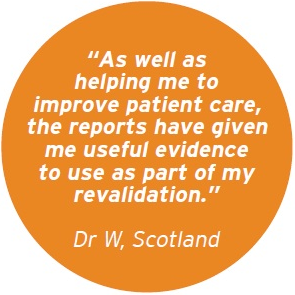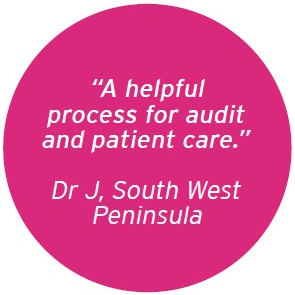Confidential reports designed to help GPs improve the quality of care, with a focus on prescribing and patient safety, are available for practices that contribute to CPRD.
CPRD and the Royal College of GPs (RCGP) have developed confidential, bespoke drug prescribing reports for individual practices, available for free for GP practices contributing to CPRD.
The reports provide a pseudonymised list of patients at the practice so that GPs can re-identify and review their care. Reports also show the practice’s prescription rate benchmarked against other participating GP practices. Each report covers a selection of safety indicators and enables collection of evidence for annual appraisals under Domain 2 (Safety and Quality).
Unlike much of the performance measurement information that a practice receives, this report is for practice-use only and is not made available in the public domain.
Below you can view examples, created using sample data, for the following reports:
- Prescribing of valproate to patients of childbearing potential
- Patient safety and prescribing in patients with a learning disability, autism or both
- Heart and circulatory system
GPs are invited to take an active role in suggesting indicators for future reports.
Further information is available on the RCGP website. On the NIHR website you can view a blog by Dr Tommy Hunter about how he has used a report at his own practice.
CPRD news item: NHS England guidance for medication review in primary care recommends patient safety and prescribing reports developed by CPRD and RCGP.
To receive the reports, practices must be contributing to CPRD.




Prescribing of valproate to patients of childbearing potential
The latest report is on prescribing of valproate to patients of childbearing potential.
- Download: Sample RCGP/CPRD quality improvement report December 2021 (EMIS) (PDF, 987KB, 6 pages)
- Download: Code list for classifying patients who cannot become pregnant (EMIS) (Text file, 18KB, 1 page)
- Download: Code list for recording a Pregnancy Prevention Plan (PPP) (EMIS) (Text file, 6KB, 1 page)
- Download: Code list for valproate prescription (EMIS) Text file, 19KB, 1 page)
- Download: Sample RCGP/CPRD quality improvement report December 2021 (Vision) (PDF, 987KB, 6 pages)
- Download: Code list for classifying patients who cannot become pregnant (Vision) (Text file, 11KB, 1 page)
- Download: Code list for valproate prescription (Vision) (Text file, 21KB, 1 page)
Patient safety and prescribing in patients with a learning disability, autism or both
Managing the prescription of psychotropic medication for adults with learning disabilities, autism, or both in order to minimise potential negative impacts is a challenging process for primary care. In order to support GPs and primary care pharmacists with this, reports include the following indicators:
- Long-term prescription of anti-psychotics to patients with learning disabilities, autism or both
- Long-term prescription of anti-depressants to patients with learning disabilities, autism or both
These indicators are based on NHS England's Stopping Over-Medication of People with a Learning Disability, Autism or Both (STOMP) project, which aims to improve the quality of life of people with a learning disability, autism or both by reducing the potential harm of inappropriate psychotropic drugs.
For each of the indicators, the reports:
- Show how the practice’s prescription rate compares with peers
- Allow GPs to re-identify patients whose treatment may need review
- Provide support material that summarises STOMP and NICE guidance
-
Download: Sample RCGP/CPRD quality improvement report (EMIS) (PDF, 1MB, 9 pages)
-
Download: Sample RCGP/CPRD quality improvement report (Vision) (PDF, 1MB, 9 pages)
-
Download: Code lists for learning disabilities report (Excel, 46KB, 6 sheets)
Heart and circulatory system reports
The heart and circulatory system QI report includes three indicators taken from the RCGP patient safety toolkit and one that was suggested by NICE:
- Prescription of glitazones to patients with heart failure
- Prescription of non-steroidal anti-inflammatory drugs (NSAIDs) to patients with heart failure
- Prescription of NSAIDs to patients with chronic kidney disease (CKD)
- Aspirin monotherapy for stroke prevention in patients with atrial fibrillation
Below you can view an example report, created using sample data.
-
Download: Sample RCGP/CPRD quality improvement report (EMIS) (PDF, 1MB, 17 pages)
-
Download: Sample RCGP/CPRD quality improvement report (Vision) (PDF, 1MB, 19 pages)
-
Download: Code lists for heart and circulatory system reports (Excel, 81KB, 20 sheets)
Further information
For more information about the reports email gpnetwork@mhra.gov.uk or call 020 3080 7206.
Publications:
- Quality improvement of prescribing safety: a pilot study in primary care using UK electronic health records. (Booth et al. Br J Gen Prac. 2019 69 (686) e605-e611)
- Use of prescribing safety quality improvement reports in UK general practices: a qualitative assessment. (Khan et al. BMC Health Serv Res 21, 394 (2021))